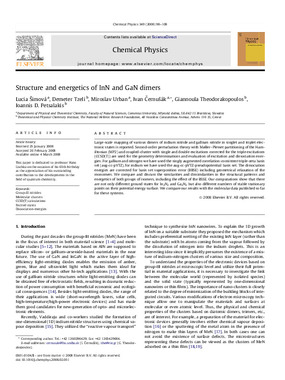Παρακαλώ χρησιμοποιήστε αυτό το αναγνωριστικό για να παραπέμψετε ή να δημιουργήσετε σύνδεσμο προς αυτό το τεκμήριο:
https://hdl.handle.net/10442/12582[1]
L. Simova, D. Tzeli, M. Urban, I. Cernusak, G. Theodorakopoulos, and I. D. Petsalakis, “Structure and energetics of InN and GaN dimers,” Chemical Physics, vol. 349, no. 1–3, pp. 98–108, Jun. 2008.
| Εξειδίκευση τύπου : | Άρθρο σε επιστημονικό περιοδικό |
| Τίτλος: | Structure and energetics of InN and GaN dimers |
| Δημιουργός/Συγγραφέας: | Simova, Lucia [EL] Τζέλη, Δήμητρα[EN] Tzeli, Demeter  Urban, Miroslav Cernusak, Ivan [EL] Θεοδωρακοπούλου, Γιαννούλα[EN] Theodorakopoulos, Giannoula  [EL] Πετσαλάκης, Ιωάννης Δ.[EN] Petsalakis, Ioannis D.  |
| Εκδότης: | Elsevier BV, North-Holland |
| Τόπος έκδοσης: | AMSTERDAM |
| Ημερομηνία: | 2008-06-16 |
| Γλώσσα: | Αγγλικά |
| ISSN: | 0301-0104 |
| DOI: | 10.1016/j.chemphys.2008.02.051 |
| Περίληψη: | Large-scale mapping of various dimers of indium nitride and gallium nitride in singlet and triplet electronic states is reported. Second-order perturbation theory with Moller-Plesset partitioning of the Hamiltonian (MP2) and coupled-cluster with single and double excitations corrected for the triple excitations (CCSD(T)) are used for the geometry determinations and evaluation of excitation and dissociation energies. For gallium and nitrogen we have used the singly augmented correlation-consistent triple-zeta basis set (aug-cc-pVTZ), for indium we have used the aug-cc-pVTZ-pseudopotential basis set. The dissociation energies are corrected for basis set superposition error (BBSE) including geometrical relaxation of the monomers. We compare and discuss the similarities and dissimilarities in the structural patterns and energetics of both groups of isomers, including the effect of the BSSE. Our computations show that there are not only different ground states for In2N2 and Ga2N2 but also different numbers of stable stationary points on their potential energy surface. We compare our results with the molecular data published so far for these systems. |
| Τίτλος πηγής δημοσίευσης: | Chemical Physics |
| Τόμος/Κεφάλαιο: | 349 |
| Τεύχος: | 1-3 |
| Σελίδες: | 98-108 |
| Θεματική Κατηγορία: | [EL] Χημεία (Γενικά)[EN] Chemistry (General) [EL] Φυσική[EN] Physics  |
| Λέξεις-Κλειδιά: | group-III nitrides molecular clusters CCSD(T) calculations excited states dissociation energies Chemistry, Physical Physics, Atomic, Molecular & Chemical |
| Αξιολόγηση από ομότιμους (peer reviewed): | Ναι |
| Κάτοχος πνευματικών δικαιωμάτων: | © 2008 Elsevier B.V. All rights reserved. |
| Ηλεκτρονική διεύθυνση περιοδικού (link) : | http://www.elsevier.com/locate/chemphys |
| Εμφανίζεται στις συλλογές: | Ινστιτούτο Θεωρητικής και Φυσικής Χημείας (ΙΘΦΧ) - Επιστημονικό έργο |
Αρχεία σε αυτό το τεκμήριο:
| Αρχείο | Περιγραφή | Σελίδες | Μέγεθος | Μορφότυπος | Έκδοση | Άδεια | |
|---|---|---|---|---|---|---|---|
| 12582.pdf Restricted Access | 433.67 kB | Adobe PDF | Δημοσιευμένη/του Εκδότη |  |  Δείτε/ανοίξτε |




